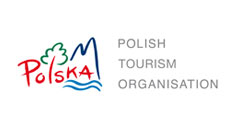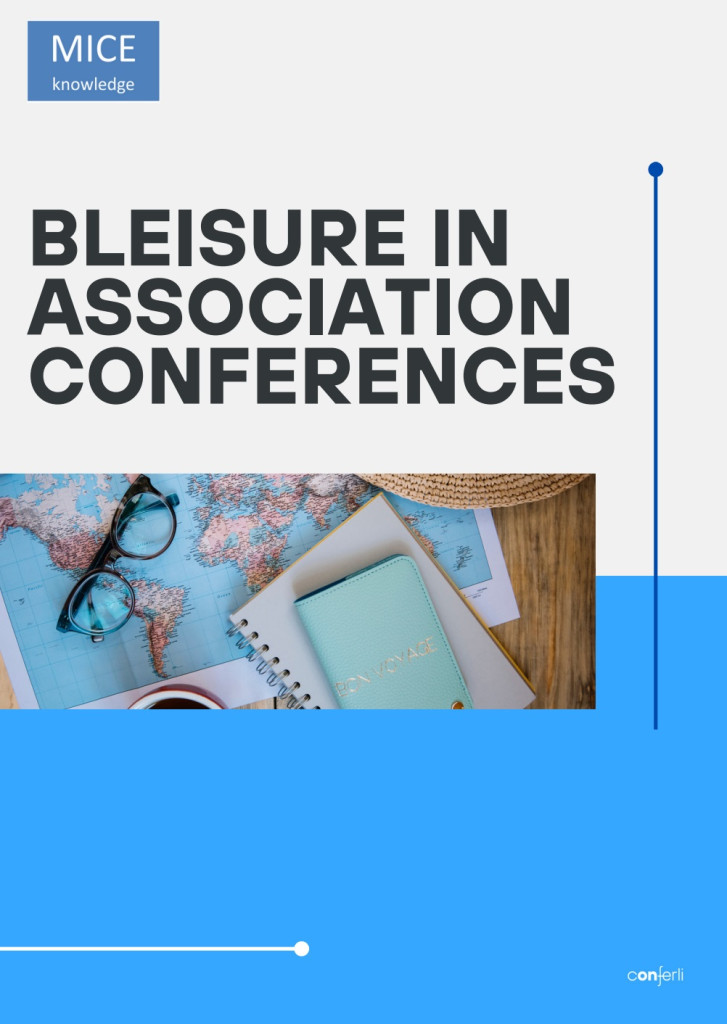Survey of association conference planners indicates changing attitudes to bleisure
In a collaborative effort between MICE Knowledge by Rob Davidson and Conferli latest survey delves into the changing dynamics within association conferences. A survey of association conference planners indicates changing attitudes to bleisure. The report features also bleisure opportunities in Poland for event professionals.
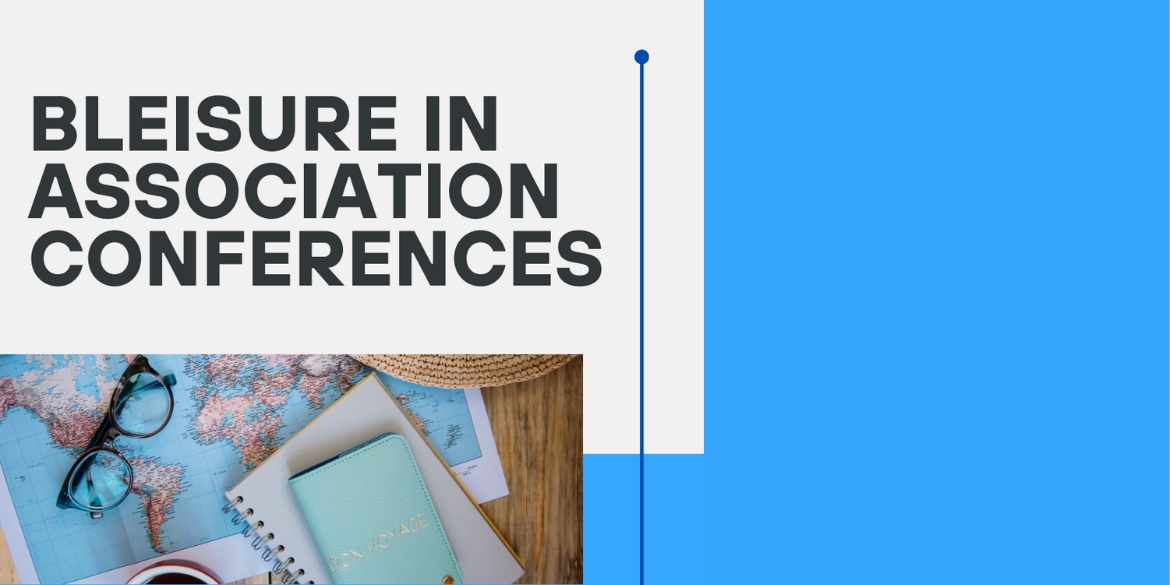
What is bleisure?
Bleisure (‘business + leisure’) visitors are people who add extra days to their conference or business trip for leisure activities such as sightseeing, sports, entertainment, or simply relaxation, turning their business visit into a holiday experience. Since the relaxation of
travel restrictions linked to the Covid pandemic, Bleisure has been growing fast in Europe and beyond, as a growing number of people choose to prolong their business trips for leisure purposes.
Because of the number of participants they attract, association conferences have the potential to add significantly to the Bleisure trend, boosting tourism in the destinations where these events are held. But is that potential being realised?
The Report Bleisure in Association Conferences
This new report, Bleisure in Association Conferences, reveals the results of the first survey of association conference planners worldwide that focuses specifically on their members’ attitudes towards spending extra days for leisure activities in conference destinations. The survey also explores current trends in the provision of pre- and post-conference tours as well as spouse programmes.
“For most respondents, the ideal association conference combines work and leisure. Striking a balance between opportunities to connect with peers and to discover the destination is the optimal scenario. Destination appeal is judged on a broad range of factors, including the ability to extend the trip beyond the conference and having a range of activities to experience, including food and wine, history, culture and iconic attractions.“
One-third of respondents reported that the leisure attractions of cities are a very important factor for them when they are choosing destinations for their events. Less than 1 in 5 of the conference planners surveyed said that leisure attractions were completely unimportant to them.
When asked to estimate the average percentage of their conference participants who usually stay longer in the destination for leisure purposes, over 1 in 5 of the respondents admitted that they did not know because this was something that they did not measure. But
over one-third of respondents reported that 30% or more of their participants spend extra days in the conference destinations for leisure activities, before or after the actual event.
In response to the question of whether Bleisure was a growing phenomenon for their conference participants, the two most common responses were that it was either ‘growing’ (approximately 30% of the respondents) or ‘staying the same’ (approximately 30% of the
respondents). However, almost 20% reported that Bleisure as an activity was declining among their conference participants, mainly due to financial challenges, increasing work pressure or family obligations.
The findings revealed in Bleisure in Association Conferences are significant for all destination marketing organisations and also for conference planners regarding the current attitudes of association members towards adding Bleisure elements to the conferences they
attend.
The report may be downloaded free from HERE.
Key Insights Summary
- Bleisure Boom: The easing of post-Covid restrictions is fueling a surge in Bleisure, transforming business trips into complete holiday experiences.
- Destination Significance: One in three planners prioritizes leisure attractions when choosing conference locations, challenging traditional selection norms.
- Growing Phenomenon: Approximately 30% of association planners observe a rising trend in Bleisure activities among conference participants, adding a new dimension to these events.
- Work-Life Challenges: However, nearly 20% report a decline in Bleisure, attributing it to financial constraints, work pressures, or family obligations.
- Data Disconnection: Over 20% of planners do not track participant stays for leisure, indicating a gap in understanding attendee behavior.
Bleisure in Poland
You will find two pages dedicated to Poland in the report in sections called "The Rise of Bleisure Travel in Poland: A Perspective from Industry Experts" In the fast-paced world of business travel, a new trend is emerging, one that blurs the boundaries between work and leisure. "Bleisure," the fusion of business and leisure, is gaining ground as professionals seek to make the most of their work-related trips by adding a touch of personal enjoyment to their itineraries.
Paula Fanderowska, Chairman of the Board of the Polish Conference & Congress Association, and Aneta Ksiazek, Head of the Poland Convention Bureau, share their insights on this evolving concept. Download the full report to discover more.
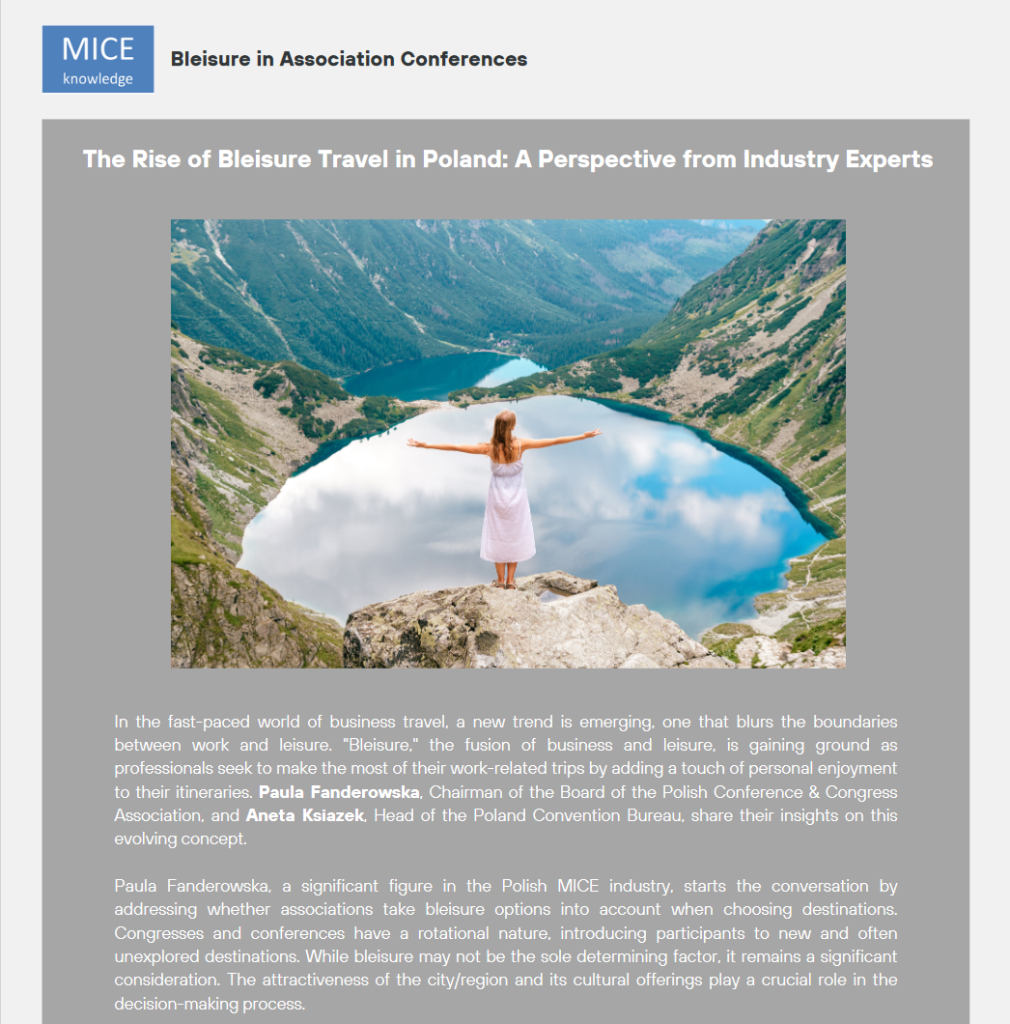
Paula Fanderowska, starts the conversation by addressing whether associations take bleisure options into account when choosing destinations. Congresses and conferences have a rotational nature, introducing participants to new and often unexplored destinations. While bleisure may not be the sole determining factor, it remains a significant consideration. The attractiveness of the city/region and its cultural offerings play a crucial role in the decision-making process. Associations also inquire about bleisure options in specific destinations, with non-corporate clients seeking comprehensive information.
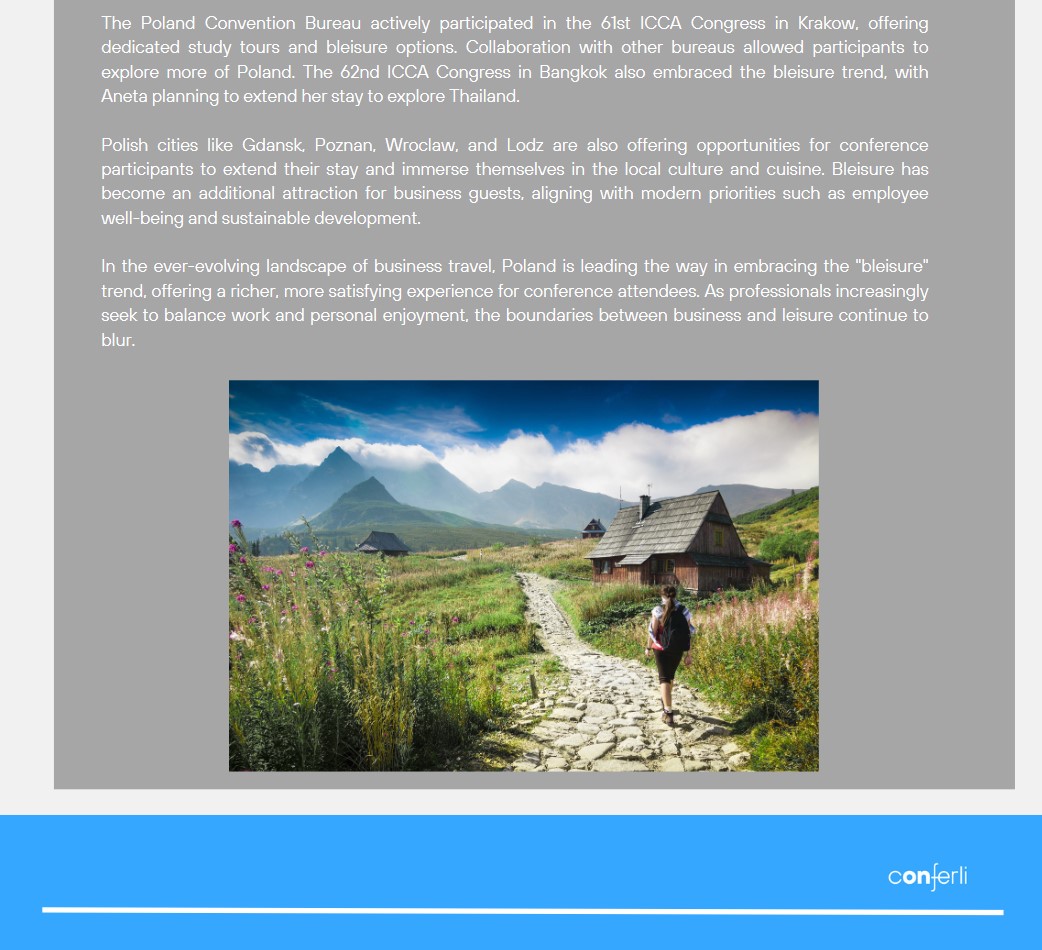
The evolving concept of bleisure is closely tied to the post-pandemic reality, where sustainability has gained immense importance. Planners and meeting owners are now focused on minimising the negative impact on the environment and embracing the local community, culture, and traditions. Bleisure becomes the ideal solution for fully exploring a destination.
Aneta Ksiazek emphasizes that bleisure is integrated into the bidding process for events. Bid books influence decisions based not only on logistics and infrastructure but also on well-being aspects, local traditions, and cuisine. Participants are increasingly looking for relaxation, physical activities, and culinary experiences beyond the event content.
The role of Convention and Visitors Bureaus (CVBs) is pivotal in presenting the destination's appeal, and venues that act as knowledgeable advisors are highly valued. As for what interests congress and conference participants, they are drawn to tourist and cultural experiences that the destination is known for. Recommended itineraries, concierge services, and activities such as hiking trails and culinary routes are in demand. Additionally, post-tours to other cities or regions have become a popular promotional tool, allowing participants to explore more of the host country. Polish cities like Gdansk, Poznan, Wroclaw, and Lodz are also offering opportunities for conference participants to extend their stay and immerse themselves in the local culture and cuisine. Bleisure has become an additional attraction for business guests, aligning with modern priorities such as employee well-being and sustainable development. In the ever-evolving landscape of business travel, Poland is leading the way in embracing the "bleisure" trend, offering a richer, more satisfying experience for conference attendees.
Aneta Ksiazek recounts the transformation of business trips in the age of social media, where professionals can now extend their stays, optimise costs, and reduce their environmental impact. This trend, referred to as "bleisure," gained significant traction during the COVID-19 pandemic, as remote working allowed professionals to fulfil their job responsibilities from almost anywhere in the world. The Poland Convention Bureau actively participated in the 61st ICCA Congress in Krakow, offering dedicated study tours and bleisure options. Collaboration with other bureaus allowed participants to explore more of Poland.
The Report authors
MICE Knowledge, headquartered in London, specializes in research, education, and training for the international meetings industry. Dr. Rob Davidson, the Managing Director and author of seven books on the MICE industry, leads the consultancy. Visit their website at www.miceknowledge.com. Conferli, on the other hand, is a conference match-making platform designed for organizers, venues, and destinations. Their goal is to level the playing field in the event industry, making it easier for events of all sizes to find the most suitable destinations. This is achieved through access to independent benchmarking data, powered by smart technology and driven by their passion for the conference world. Visit their website at www.conferli.com.
Source: Conferli, #PolandCVB
@callmejaro

